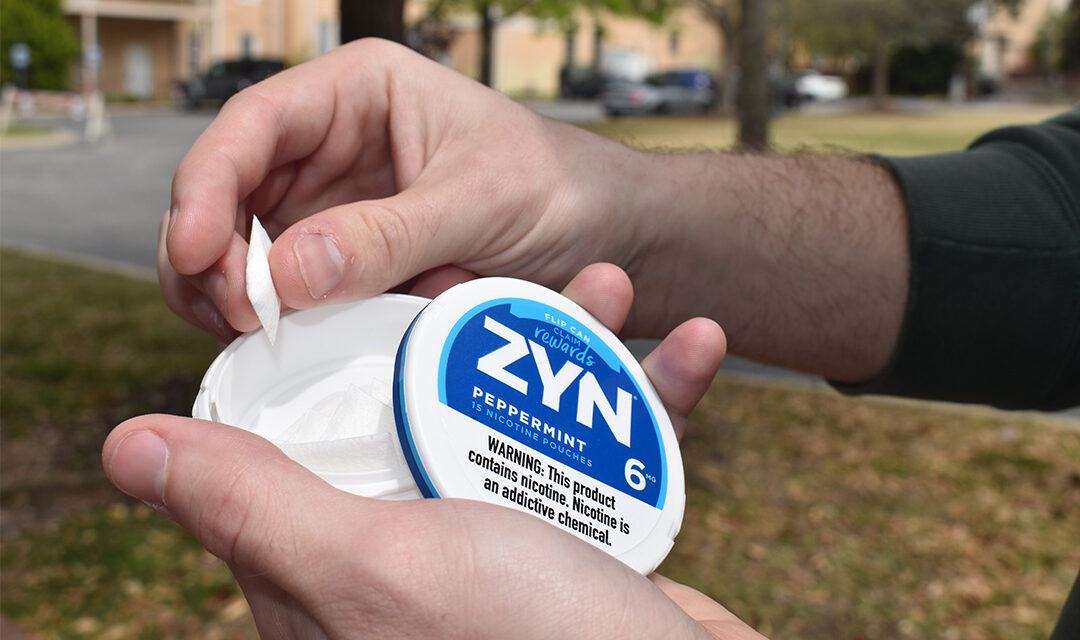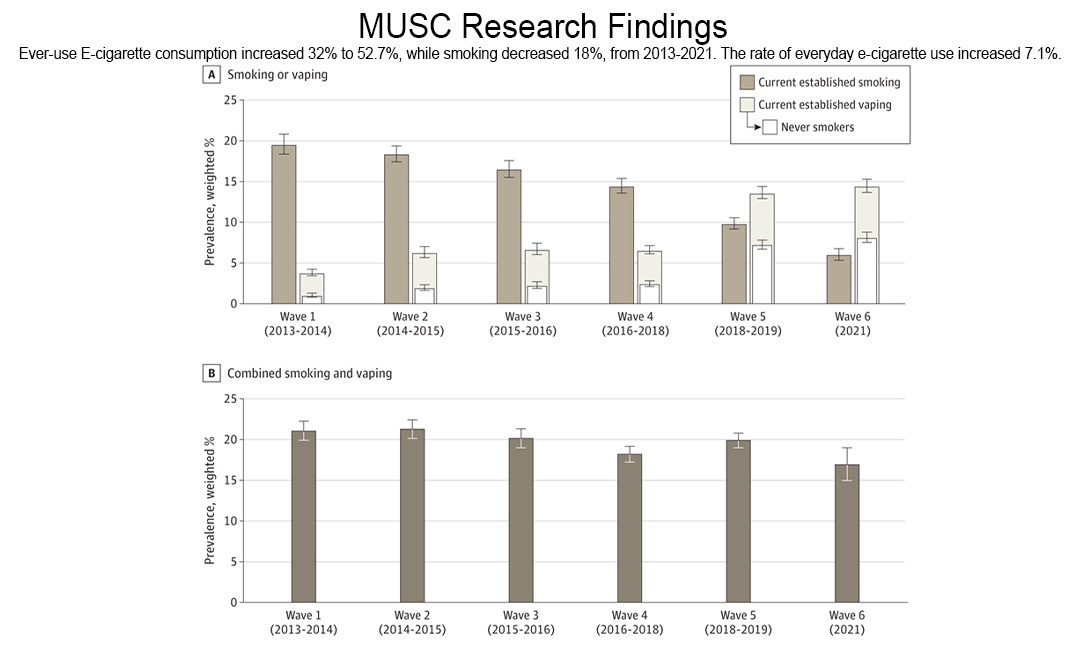Zyn nicotine pouches slowly release nicotine in users’ bodies after they place the pouch against their gum. (Photo by Emmy Ribero/Carolina News and Reporter)
Kelly Donoghue, a teacher in Dorchester School District 2 in Summerville, spends all day with high school students.
She knows more students are getting caught on campus with a smokeless nicotine product. And she assumes students are vaping it or putting tiny nicotine pouches in their mouths while sitting in class.
She said she has never seen a student do it in her class. But in many cases, it would be hard to tell, she said.
“When I was younger, that wasn’t an option for you,” Donoghue said. “So you had to smoke cigarettes, which had a smell. There was a definite odor to it. And you couldn’t just bust that out anywhere.”
The use of combustible tobacco – cigarettes and cigars – is declining nationally, studies show. But nicotine use remains mostly steady. Research done by Brandon Sanford at the Medical University of South Carolina attributes that to more vaping, especially among young people.
His study shows the rate of taking in nicotine by vaping increased 21% from 2013-2021, while cigarette smoking decreased 18%.
It’s a growing concern in South Carolina.
The risk for addiction lies in how easy it is to use nicotine without people knowing, Sanford said.
That means “getting away with doing it in class, for example, or in your room,” Sanford said. “You could theoretically just kind of keep Zyn in all day.”
Also, the intensity of smokeless nicotine addiction has increased, with more people using it within five minutes of waking up, according to findings published by the JAMA Network Open medical journal.
“I think that (using a new delivery device) allows them to start that addiction way sooner than some and at a larger capacity,” Donoghue said.
Sanford said something else surprising stands out in his research: Most new users didn’t switch from cigarettes to smokeless products, meaning those products were their first introduction to nicotine.
The products were initially touted as a way to reduce cigarette use.
Health concerns
Using nicotine of any kind has many health implications. But addiction at a younger age is the most concerning to experts.
Ashley Bodiford, director of prevention at the nonprofit Lexington/Richland Alcohol and Drug Abuse Council, said brains aren’t fully developed until people are about 25 years old.
“Individuals that are experimenting with substances before then are putting themselves at about a five times greater risk for developing a substance use disorder,” Bodiford said.
Like Donoghue, teachers around the state are noticing younger people using these devices more often.
“It’s starting younger and younger,” said Maureen Shuler, a teacher at Braiser High School, a public charter in Simpsonville.
Shuler has small classes and a homeroom class the school calls “enrichment” that encourages connections between teacher in students. One day, a freshman said he wished he could go “one day without being offered a vape,” she said.
“My mouth dropped,” Shuler said. “Like, ‘What? Where is this happening?’ And they’re like, ‘Well, at lunch or gym locker room.'”
Beth Bernstein, a Democratic state representative from Richland County, is sponsoring a bill that addresses the increased use of tobacco products by young people. The bill would prohibit minors from entering a tobacco retailer and strengthen penalties for tobacco retailer violations.
The bill has been in the House Judiciary Committee since last year.
The popularity of Zyn
Zyn nicotine pouches – used like dipping tobacco – are even more subtle than vaping.
Sanford said nicotine is released slower with Zyn than other products. But Zyn has a higher concentration of nicotine, so it’s hard to tell which products create more nicotine exposure.
A lawsuit was recently filed against Philip Morris, the company that sells Zyn products. Schmidt National Law firm in California filed a lawsuit against Philip Morris on March 6, alleging it markets to minors and fails to properly inform users of Zyn’s dangers. Those could include addiction, gum diseases, cardiovascular harm, gastrointestinal complications and even cognitive impairment, the lawsuit states.
“The issue at hand is that Philip Morris has minimized the potential for addiction, and the related health issues, in their advertising,” Schmidt National Law said in a press release.
LRADAC’s Bodiford said proper information is lacking about these products, and that’s leading people to uninformed decisions.
“People should know what they’re putting into their bodies and what they’re ingesting,” she said.
The FDA has approved certain vapor products. But the FDA has not approved Zyn nicotine pouches, even though the product has been on the U.S. market for 10 years.
FDA press officer Jim McKinney declined to comment on Zyn’s request for approval. But he said the agency “remains concerned about any new tobacco product that may appeal to youth.”
McKinney said the agency weighs whether companies use marketing to appeal to young people and whether they use age restrictions to keep teens from using the products.
Bodiford said LRADAC has seen an uptick in calls from schools asking for advice on developing policies about nicotine use on campus.
LRADAC has helped young people navigate various kinds of substance use, prevention, treatment and recovery.
Still, Sanford said using vapor products and nicotine pouches are better than combustible products.
And cigarettes are more harmful than vaping with e-cigarettes, and e-cigarettes are more harmful than nothing, Sanford said.
While the penalty for having nicotine products in some schools is expulsion, Bodiford said her organization works with schools by having programs that offer help instead of punishment.
Students need “an appropriate referral chain and option if they were to find themselves misusing substances on a school grounds,” she said.
Results of Brandon Sanford’s nicotine research study (Courtesy of the Medical University of South Carolina/Carolina News and Reporter)
Various vape brands with bright colors and a variety of flavors (Photo by Emmy Ribero/Carolina News and Reporter)
Headquarters of the Lexington/Richland Alcohol and Drug Abuse Council, in Columbia’s Bull Street district (Photo by Emmy Ribero/Carolina News and Reporter)





